Motorhome fridges: here's what you need to know
Whether your idea of heaven at the end of the day is a cold beer or fresh food for a barbecue, there’s not much chance unless your motorhome has an efficient refrigerator
In years past, the standard motorhome fridge was a three-way absorption fridge, which works on alternative power sources, but, in recent years, compressor fridges have become increasingly common in mainstream motorhomes.
Here, we delve into the detail on motorhome fridges and provide some recommended products from Thetford, an industry-leading brand for leisure vehicle equipment.
Page contents
- How motorhome fridges work
- Absorption fridges
- Compressor fridges
- Thermoelectric fridges
- What's the best fridge for your motorhome?
- How to look after your fridge
- About our magazines
Words by Barry Norris
How motorhome fridges work
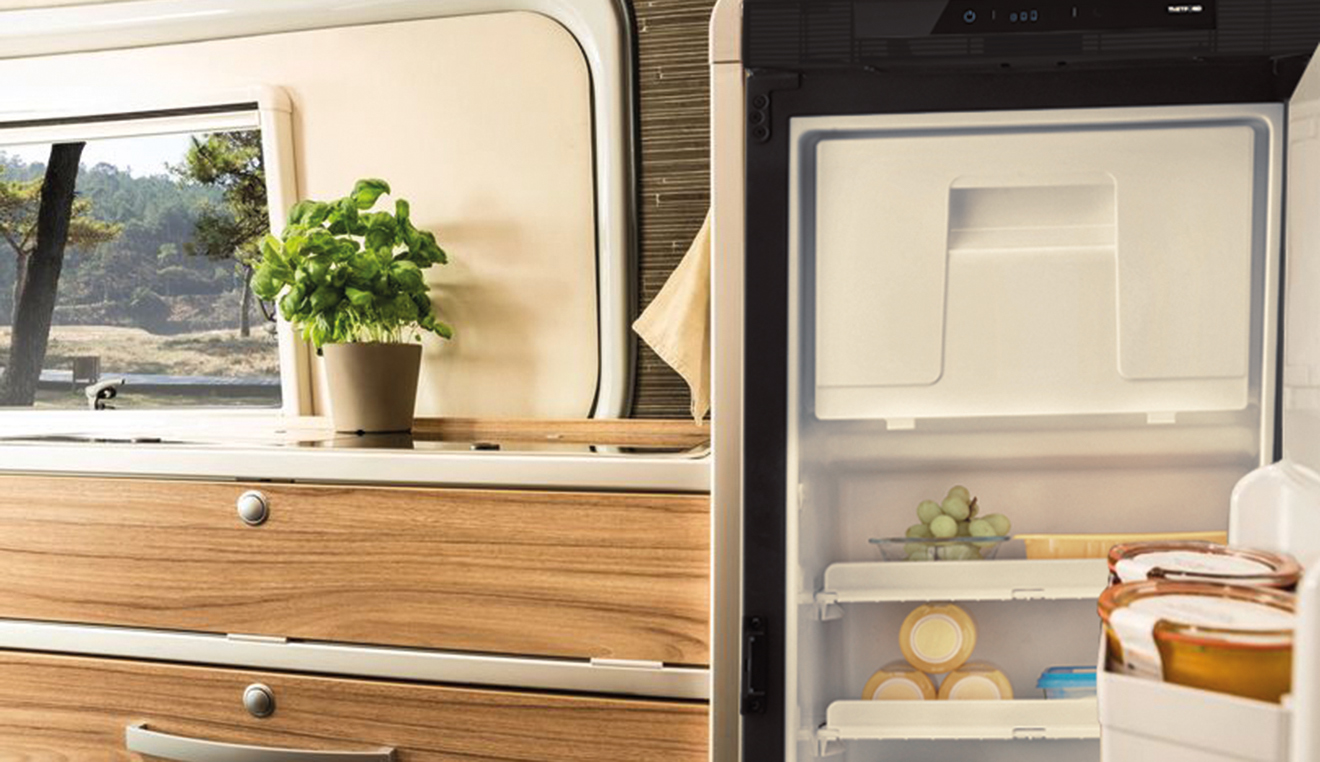
(Photo courtesy of Thetford)
We all know how essential a fridge is to a motorhome, but if you're interested in upgrading to a better option then you need to know how they work, and in slightly more detail than "they keep things cold".
Permit us to get a bit technical here, but below is exactly how motorhome fridges work.
Absorption and compressor fridges work on broadly similar principles utilising latent heat, which is taken up when a liquid vaporises into a gaseous state.
Many campers will have noticed this principle when using gas cylinders and find the top half of their cylinder cold, often with condensation formed around the outside. In this situation it’s the liquid butane or propane vaporising within the cylinder to form gas and taking in heat from its surroundings.
Absorption fridges are powered by application of heat to provide gravity circulation of a liquid known as refrigerant through a series of pipes. The cooling process is aided by the use of different chemicals in the refrigerant.
Compression fridges use a single refrigerant chemical, which changes from a gaseous state to a liquid state and back to a gas aided by the use of an electrically powered compressor.
Absorption fridges
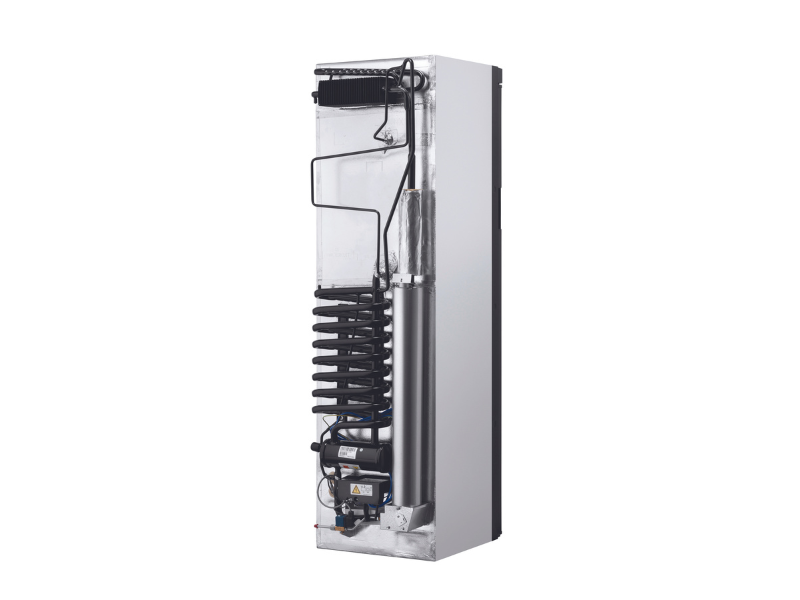
(Photo courtesy of Thetford)
Absorption fridge popularity comes from the flexibility of utilising three power sources, encompassing travel mode (12V), on the campsite with electric hook-up and gas when off-grid.
Many modern absorption fridges use automatic energy source technology to switch between the three sources. But the main advantage of an absorption system is how quiet it runs as it has no moving parts.
One drawback, though, is the heat produced, which necessitates good external ventilation. Use of gas as a fuel also requires good external ventilation and for the fridge to be sealed from the habitation area. Particularly at higher ambient temperatures, performance is strongly dependent on the airflow along the rear of the fridge, necessitating two vents with cold air coming in at the bottom vent and hot air venting at the top.
Many motorhomes do feature these vents already and they can be installed by an approved technician, so this shouldn't be a barrier to getting an absorption fridge.
Although an absorption fridge works well, it can take up to eight hours to get down to temperature and it performs best at medium and lower ambient temperature (10 to 32˚C).
At the higher end of temperatures, performance can be enhanced with a fan to boost ventilation. Absorption fridges are also sensitive to tilting and need to be levelled so not more than 2.5 degrees out of level.
Compressor fridges
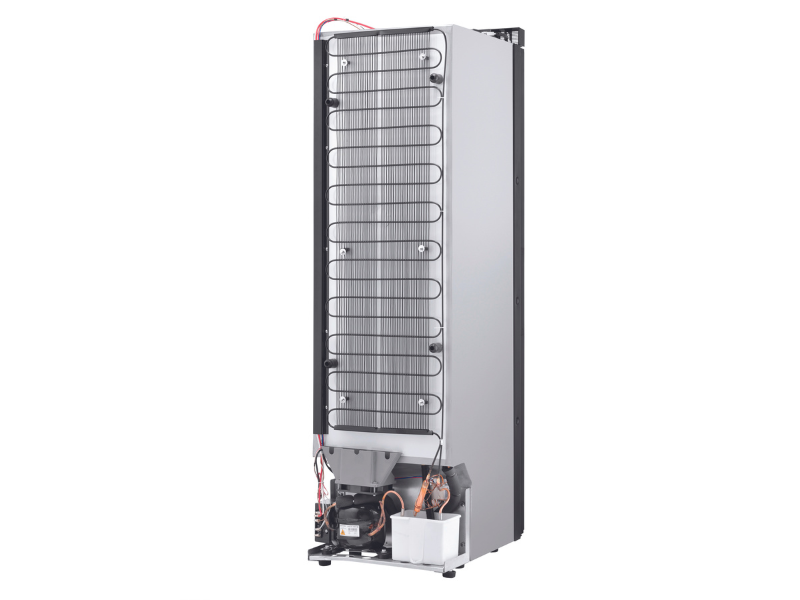
(Photo courtesy of Thetford)
Two of the main reasons for the lack of compressor fridges in motorhomes until recently has been noise and power consumption.
Most domestic refrigerators are compressor fridges, which use an electrical compressor with accompanying noise particularly on start-up and stopping.
In a domestic situation this noise is lost among ambient daytime kitchen noise and at night-time it’s usually isolated from the sleeping areas, which isn’t practical in a motorhome.
In recent years, compressor fridge technology has moved on and noise levels are much more minimal. Some even have a night-time mode, which reduces noise further at night and conserves power.
A compressor fridge cools down more quickly and performs better in higher ambient temperatures (up to 40˚C) than an absorption fridge. Less heat is created with compressor fridges, which means internal ventilation can be used, lowering the need to cut more holes in the bodywork.
Despite the development of more efficient compressor fridges using less power than an absorption fridge working on electricity, they still result in a considerable drain on the battery. However, with the advent of large-capacity lithium batteries, economical solar panels and battery-to-battery (B2B) chargers, the use of compressor fridges has become more attractive.
In addition, modern technology is such that compact compressors and fans enable compressor fridges to be lighter than their absorption competitors and they can, size for size, provide up to 10% more usable internal space.
Thermoelectric fridges
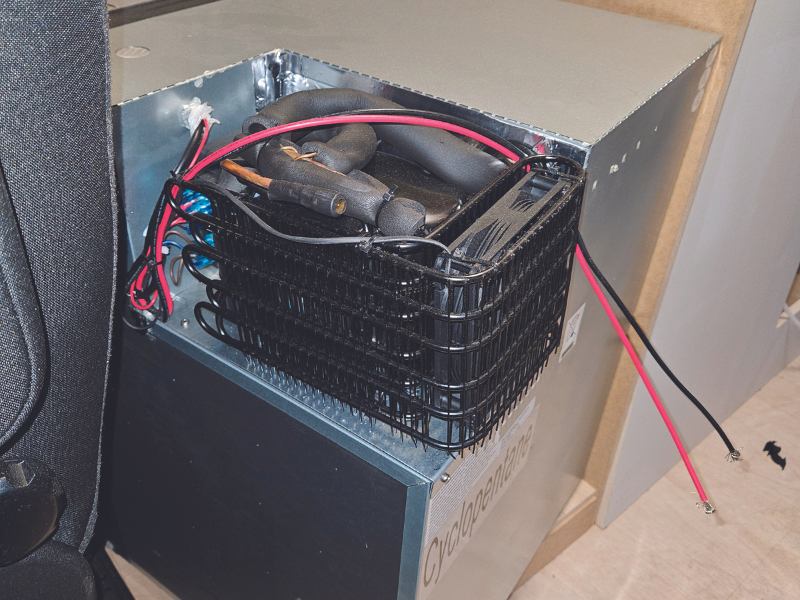
(Photo courtesy of Barry Norris)
There’s also a thermoelectric system, which doesn’t use any refrigerant or have any moving parts, but works by electricity flowing through two different types of metal conductor. This is also known as the Peltier effect.
Unfortunately, when this is scaled up it becomes uneconomical. Campers tend to find this system used in some portable coolers where they can only cool down to about 20˚C below ambient temperatures.
What's the best fridge for your motorhome?
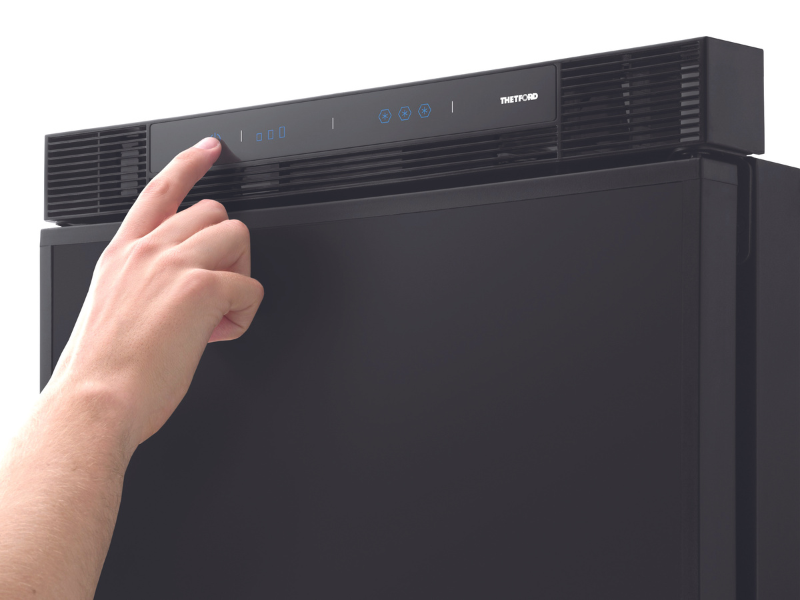
(Photo courtesy of Thetford)
In short, it depends on how you camp and the power set-up in your motorhome.
For smaller units you are likely to find there’s more choice of compact compressor fridges available as it’s easier to locate a space for a fridge that doesn’t need external ventilation.
With a mainstream motorhome, if you carry a good supply of gas and like to spend time off-grid, then an absorption fridge could be good for you. An 81-litre fridge will empty a 6kg gas cylinder approximately every three weeks and a 150-litre fridge/freezer will last about two weeks.
An absorption fridge of any size working on gas will only consume about 60mA or 1.44Ah per 24 hours of electricity for the control system.
An 85-litre compressor fridge will use around 25Ah per 24 hours at ambient temperature of 20˚C to power the controls and compressor. As the ambient temperature increases, so does the compressor electricity consumption increase. After three days such a fridge would consume 75Ah, which is as much as you would wish to take out of a 150Ah lead acid battery and this is assuming there is no other drain on the battery.
However, if you have good off-grid kit and/or you tour a lot, then a compressor fridge could be ideal. Remember with a B2B charger coupled to a lithium battery, an hour or so of driving will give a substantial boost to a battery.
Lithium batteries also allow you to take them down to around 10% of full capacity with minimal long-term detrimental effect. If you spend a lot of time in the south of France or Spain in summer, you may prefer a compressor fridge to cope with higher ambient temperatures and there’s the bonus that a solar panel could supply much of the fridge’s power.
If you’re looking for the most efficient fridge, check if the freezer compartment temperature is individually controlled. Freezers use more energy than equivalent fridge volume so the ability to turn down the freezer temperature when not in use is worthwhile.
Here's the best Thetford fridges for motorhomes
Thetford is renowned as producing some of the best utilities for motorhomes, caravans, campervans and tents, including fridges. Here's our pick of the best!
N4080
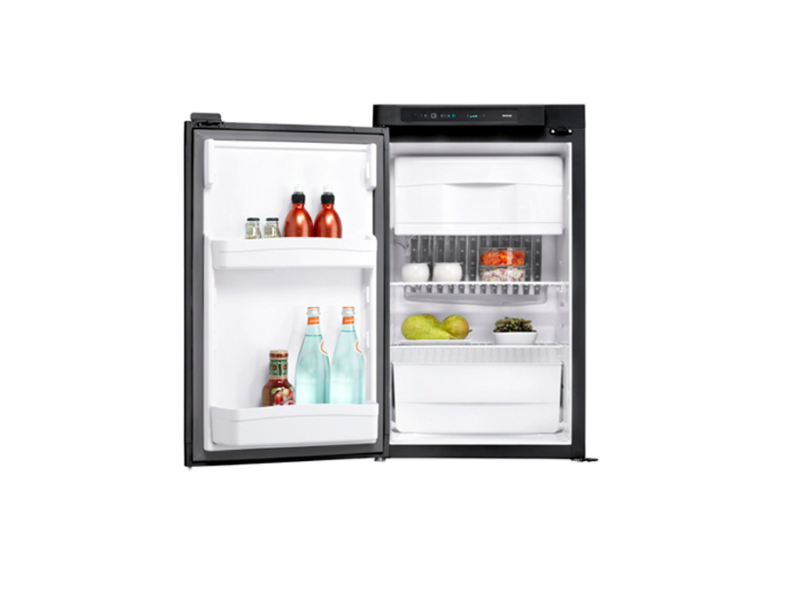
(Photo courtesy of Thetford)
This tabletop absorption fridge from Thetford has a total volume of 71 litres, giving you plenty of storage for your food and drink. The matte black door panel and LED display create a sense of sophistication, and the 82cm height ensures that this fridge will fit securely within the kitchen of most motorhomes.
N4141
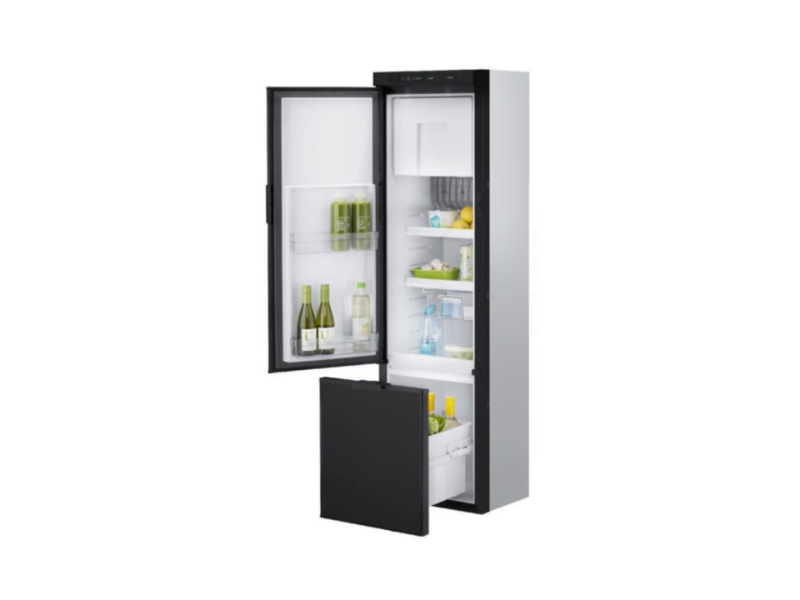
(Photo courtesy of Thetford)
A slim absorption fridge, the N4141 features a distinctive pull-out tray at the bottom with enough space to house two-litre bottles (and wine, of course). It has a 141-litre capacity, including a 15-litre frozen food section. While this is a tall fridge and won't fit all motorhomes, it is a high-performing and stylish option for those with the space.
T2090
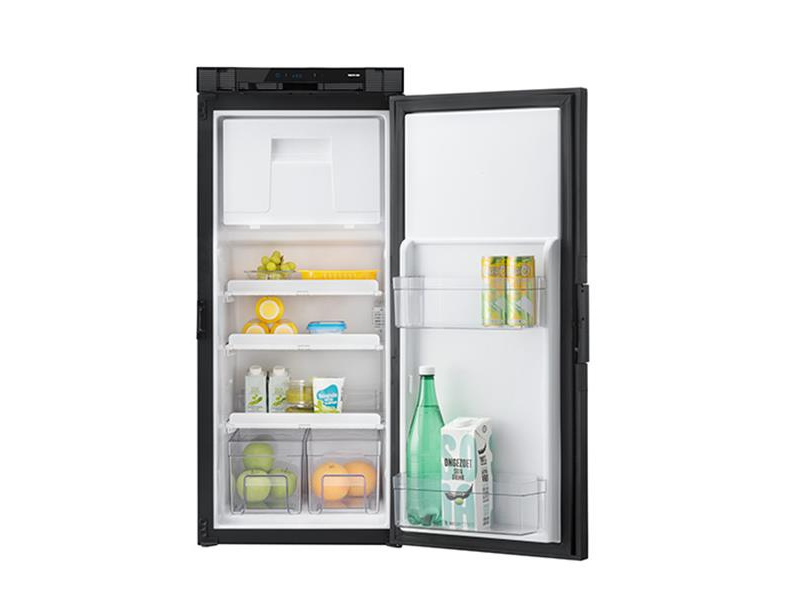
(Photo courtesy of Thetford)
At just over 97cm tall and with an 84-litre capacity, this compressor fridge from Thetford is large enough to provide for a family on holiday without taking over the limited space in your motorhome's kitchen. It features a high-tech capacitive touchscreen and sleek exterior, too.
How to look after your fridge
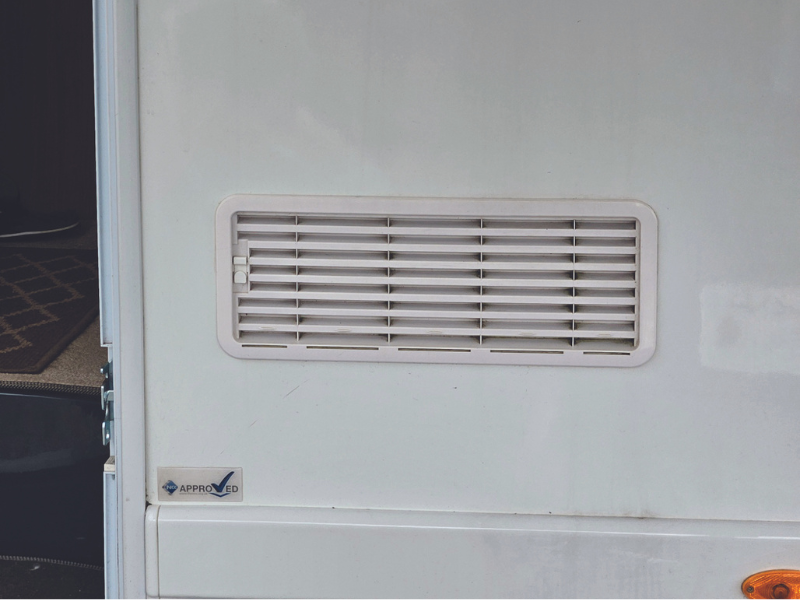
(Photo courtesy of Barry Norris)
An absorption fridge needs to be switched on up to eight hours before you load it; it’s better if the food and drink you’re packing is pre-cooled. With either type of fridge, don’t pack too tightly to allow some room for cool air to circulate between items and around the cooling fins.
If you are going on a ferry with an absorption fridge where gas power will not be permitted, ensure that the fridge is fully cooled before embarking and, if there’s empty space, fill with bottles of chilled water.
Try not to open the fridge door too often when in use.
If a thick layer of ice builds up on a long trip, defrost for optimum performance. Where possible, ventilate your motorhome to keep the inside temperature as low as possible.
Cleaning and maintenance is important for all types of fridge and, particularly at the end of a trip, defrost the fridge, not forgetting to put dry towels down to catch any water.
Ensure the fridge is dry and the door is left on a latch setting to let air to circulate to prevent mould growth. Clean the interior from time to time with a mild cleaner, preferably sodium bicarbonate, which will not harm the plastic nor taint food.
Fridges must be serviced in accordance with the manufacturer’s recommendations. Absorption fridges need an annual service to check for soot build-up inside the chimney and that the flame is burning correctly. Note, a fridge service is not normally included in the annual motorhome service offered by most workshops.
Ventilation is important but, during the winter, for optimum performance (winter) vent covers are recommended for absorption fridges.
Expert motorhome advice to your door!
Why not subscribe to one of our fabulous magazines and get expert advice, travel ideas, technical help and all the latest news for your motorhome and your motorhome adventures!

Want to know more about MMM magazine?
Every month MMM has articles written by motorhomers who have been there and done it, from great UK and European (and further afield) tours, campsite reviews, owners' reports and DIY projects among other things.
MMM's tests, reviews and expert buying guides are not to be missed. MMM's technical advice is a must and includes everything from weekend jobs to longer-term DIY projects. And much more!
About MMM magazine
Want to know more about What Motorhome magazine?
Every issue of What Motorhome magazine provides essential buying advice for anyone looking to buy a new motorhome or campervan or upgrade their existing model. With a pedigree of over 30 years of offering the best motorhome and campervan buying advice, every issue of What Motorhome includes more new motorhome and campervan reviews than you will find in any other magazine.
About What Motorhome
Want to know more about Campervan magazine?
Campervan is the exciting monthly magazine that will give you all the inspiration you need to explore the world in your campervan. Every issue is packed with real-life campervanning experiences, inspiring travel ideas in the UK and further afield, the best campsites to stay on, campervan road tests and reviews of the latest models, and much more!
About Campervan magazine







Recent Updates
Campervan festivals: all you need to know
Get the lowdown on going to a festival with your campervan. We've got everything you need to know, from choosing the right festival to deciding what ...
Off-grid campervans: what you need to know
Ditching electric hook-up and wild camping in your campervan is a great, low-cost way to enjoy the outdoors ...
Where and how to sell my motorhome: the ultimate guide
Whatever your reason for selling, there are a number of steps to take to try to get the best price for your ...
Gas tanks or refillable cylinders: our guide to motorhome gas
From cooking dinner to the central heating, gas is an essential feature of motorhoming – here, we explore ...
Engine management lights: all you need to know
What is the engine management light? What does it mean, and what do I have to do? ...
Motorhome air suspension: all you need to know
Motorhomes are heavy and the additional weight of equipment and height of the bodywork can increase the loads ...
Motorhome WiFi: how to get better motorhome internet
Staying connected on the move is more and more essential, so relying on campsite WiFi isn't an option – here ...
A class of their own - our guide to A-class motorhomes
Thinking of trading up to an A-class, or even going straight to the top of the motorhome tree? We guide you ...
Explore overseas on a motorhome dream tour
Enjoy exotic travel in a campervan or motorhome by hiring, swapping with someone else or exporting your ...
Motorhome water systems: everything you need to know
On-board water is an important part of every motorhome – here’s everything you need to know ...
Other Articles
Campervanning in Europe: what you need to know
Whether you're planning a leisurely drive through the French countryside, navigating bustling city streets in Italy or winding your way around ...
Campervan security: all you need to know
With thefts on the increase, it’s important to know how to keep your campervan secure and prevent campervan ...
Campervan furniture: everything you need to know
Our campervan experts guide you through all the essentials for your campervan, including tables, chairs, ...
Campervan finance: how to fund your purchase
Here we look at the different types of campervan finance available, to help you decide what’s the best option ...
Britain’s best used motorhomes
Want a great motorhome without paying the premium for a new one? Here's a guide to the best you can get in ...
Which motorhome? Choosing the perfect motorhome for you
Choosing a motorhome or campervan is one of the biggest buying decisions you’ll ever make, so it's important ...
Campervan washroom essentials: stay fresh on the road
Our guide will take you through the campervan washroom essentials you'll need so you're well-prepared for ...
Dogs in campervans: all you need to know
Follow our advice and your dog will enjoy campervanning as much as you do ...
Electric campervans: all you need to know
Our guide will take you through everything you need to know about electric campervans and what the future ...
Motorhome electrics: a complete guide to your motorhome electrical set-up
Motorhome electrics can dramatically enhance the convenience and comfort of your vehicle – but they can be ...